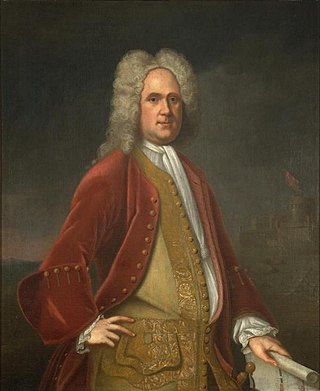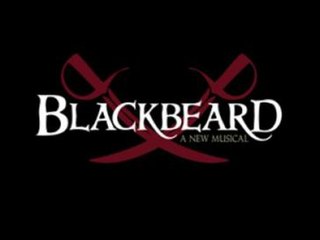Related Research Articles

Edward Teach, better known as Blackbeard, was an English pirate who operated around the West Indies and the eastern coast of Britain's North American colonies. Little is known about his early life, but he may have been a sailor on privateer ships during Queen Anne's War before he settled on the Bahamian island of New Providence, a base for Captain Benjamin Hornigold, whose crew Teach joined around 1716. Hornigold placed him in command of a sloop that he had captured, and the two engaged in numerous acts of piracy. Their numbers were boosted by the addition to their fleet of two more ships, one of which was commanded by Stede Bonnet, but Hornigold retired from piracy toward the end of 1717, taking two vessels with him.
Captain Benjamin Hornigold (1680–1719) was an English pirate who operated during the tail end of the Golden Age of Piracy.

Alexander Spotswood was a British Army officer, explorer and lieutenant governor of Colonial Virginia; he is regarded as one of the most significant historical figures in British North American colonial history.

Stede Bonnet was a Barbadian-born pirate and military officer, known as the Gentleman Pirate for the reason that he was a moderately wealthy landowner before turning to a life of crime. Bonnet was born into a wealthy English family on the island of Barbados, and inherited the family estate after his father's death in 1694. Despite his lack of sailing experience, Bonnet decided he should turn to piracy in the winter of 1716 or spring of 1717. He bought a sailing vessel, the Revenge, and travelled with his paid crew along the Eastern Seaboard of what is now the United States, capturing other vessels and burning other Barbadian ships.

Robert Maynard was a British lieutenant, and later captain, in the Royal Navy. Little is known about Maynard's early life, other than he was born in England in 1684 and then later joined the English Navy. He was made a lieutenant in January 1707, and by 1709 was the third lieutenant on HMS Bedford.

The Golden Age of Piracy is a common designation for the period between the 1650s and the 1730s, when maritime piracy was a significant factor in the histories of the North Atlantic and Indian Oceans.
The Hampton River is a 3.2-mile-long (5.1 km) tidal estuary which empties into Hampton Roads near its mouth. Hampton Roads in turn empties into the southern end of Chesapeake Bay, in southeast Virginia, United States. The Hampton River is located entirely within the city of Hampton.

Blackbeard the Pirate is a 1952 Technicolor adventure film directed by Raoul Walsh and starring Robert Newton, Linda Darnell, William Bendix, Keith Andes, and Torin Thatcher. The film was made by RKO Radio Pictures and produced by Edmund Grainger from a screenplay by Alan Le May based on the story by DeVallon Scott.

Richard Worley was a pirate who was active in the Caribbean Sea and the East Coast of the American Colonies during the early 18th century.

Piracy in the British Virgin Islands was prevalent during the so-called "Golden Age of Piracy", mainly during the years of 1690-1730. Privateering was also widely practised in the jurisdiction throughout frequent colonial wars, not least by emancipated slaves who, with in preference to back-breaking labour in the fields for pitiful wages, took enormous risks to capture fortunes on the seas with the sanction of the Crown. In 1808, Patrick Colquhoun, a prize agent for the Territory spoke of "the most daring outrages which are frequently committed by people of colour."
See also 1717 in piracy, 1719 in piracy, and Timeline of piracy.
Israel Hands, also known as Basilica Hands, was an 18th-century pirate best known for being second in command to Edward Teach, better known as Blackbeard. His name serves as the basis for the name of the villainous sidekick in Robert Louis Stevenson's 1883 novel Treasure Island.
Caesar, later known as “Black Caesar”, was a West African pirate who operated during the Golden Age of Piracy. He served aboard the Queen Anne's Revenge of Edward Teach (Blackbeard) and was one of the surviving members of that crew following Blackbeard’s death at the hands of Lieutenant Robert Maynard in 1718. Myths surrounding his life - that he was African royalty and terrorized the Florida Keys for years before joining Blackbeard - have been intermixed with legends and fictional accounts as well as with other pirates.
True Caribbean Pirates is a documentary which aired on The History Channel in 2006.

Blackbeard, or officially, Blackbeard: The Musical or Blackbeard: A New Musical, is a musical created by Rob Gardner. The plot focuses on the notorious pirate Edward "Blackbeard" Teach, and his blockade of Charles Town in South Carolina in 1718. The musical portrays Blackbeard as a compassionate person, who is deeply in love with a woman on his ship named Mary Ormond. Blackbeard struggles to maintain his fierce façade, while at the same time trying to win the heart of the pacifistic Mary.

The Battle of Cape Fear River, also known as the Battle of the Sandbars, was fought in September 1718 between two sloops from the Province of South Carolina and led by William Rhett and a group of pirate ships under the command of Stede Bonnet. Rhett's sloops defeated the pirates in the Cape Fear River estuary which led to Bonnet's eventual execution by hanging in Charleston, South Carolina.

Piracy was a phenomenon that was not limited to the Caribbean region. Golden Age pirates roamed off the coast of North America, Africa and the Caribbean.
HMS Pearl was a 42-gun fifth-rate of the Royal Navy. Her crew was involved in the hunt and death of Blackbeard in 1718.

The Flying Gang was an 18th-century group of pirates who established themselves in Nassau, New Providence in the Bahamas after the destruction of Port Royal in Jamaica. The gang consisted of the most notorious and cunning pirates of the time, and they terrorized and pillaged the Caribbean until the Royal Navy and infighting brought them to justice. They achieved great fame and wealth by raiding salvagers attempting to recover gold from the sunken Spanish treasure fleet. They established their own codes and governed themselves independent from any of the colonial powers of the time. Nassau was deemed the Republic of Pirates as it attracted many former privateers looking for work to its shores. The Governor of Bermuda stated that there were over 1,000 pirates in Nassau at that time and that they outnumbered the mere hundred inhabitants in the town.

The Proclamation for Suppressing of Pirates was issued by George I of Great Britain on 5 September 1717. It promised a royal pardon for acts of piracy committed before the following 5 January to those pirates who surrendered themselves to the correct authority before a deadline. Originally, the surrender had to occur on or before 5 September 1718; this was later extended by a second proclamation to 1 July 1719.